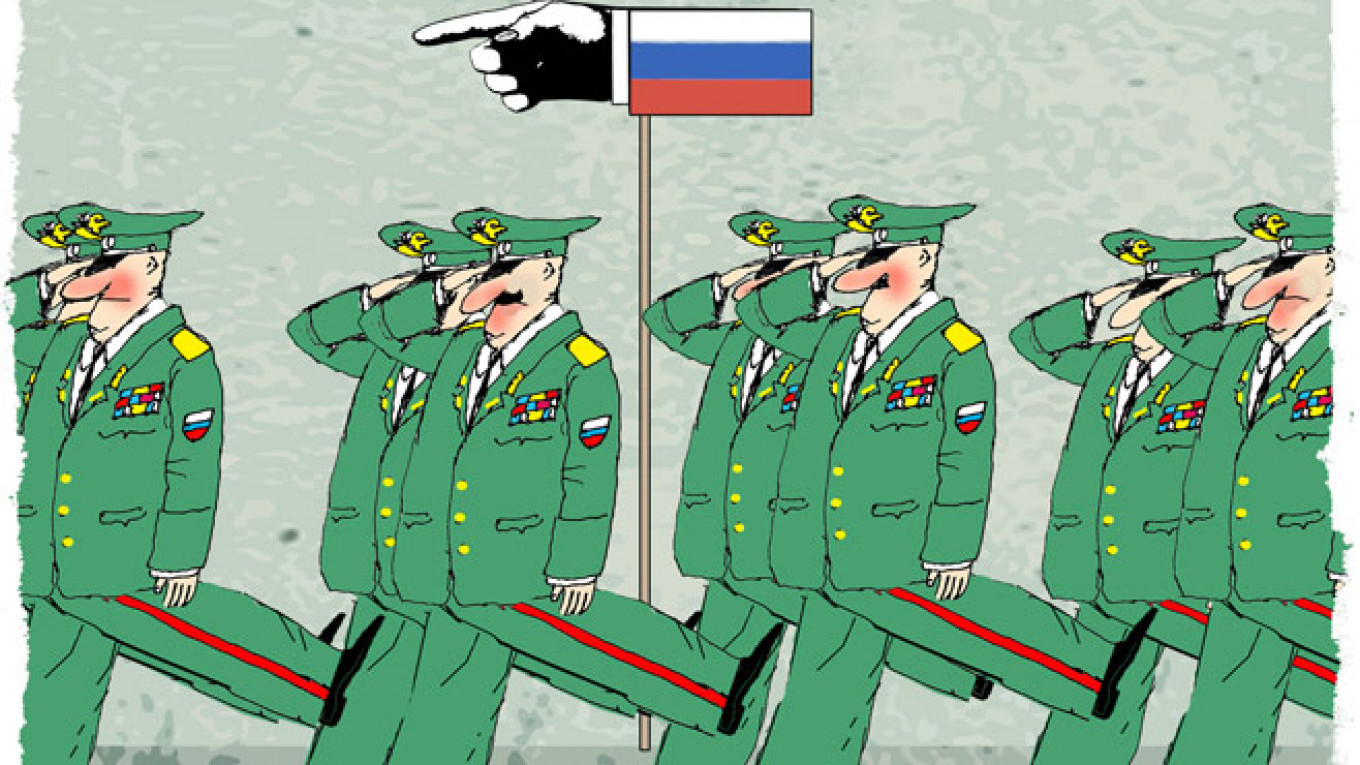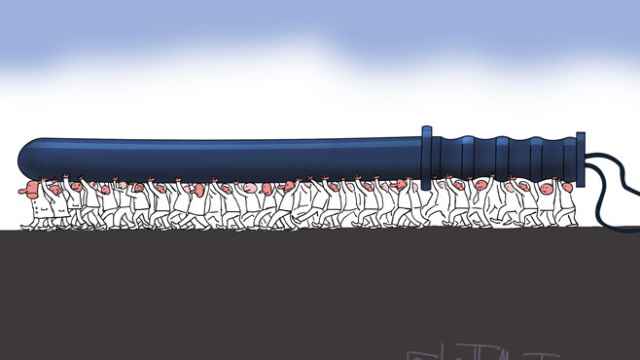Surprisingly, Russia's leaders do manage to come up with good ideas on occasion. But, of course, their subordinates immediately sabotage them to the best of their abilities. To the casual observer, it seems the military brass long ago stopped offering resistance to proposals from the president and defense minister, but Russian generals in fact continue to sabotage every order from the top that they dislike.
For example, President Vladimir Putin first began an experiment two years ago to create military reserve forces in a fairly civilized manner, and recently issued fresh orders to implement that project.
The idea was that conscripts would have the choice to voluntarily join the reserves upon completion of their mandatory year of service, and, in a step unprecedented in Russia, would even receive the modest sum of 8,000 rubles ($137) per month. In return, the reservists would attend periodic training exercises at reserve units specially created in each military command district.
The generals did not like that idea because they were accustomed to considering the entire adult male population of the country as the "reserve mobilization force." Therefore, they insisted on an alternative "experiment": create a miniscule reserve force consisting of only 300 officers and 5,000 soldiers and sergeants.
However, scale is critical: Only when reserve forces are sufficiently large is it possible to gauge whether it is possible to rapidly deploy combat-ready units on the eve of war. An "experiment" with 5,000 reservists cannot prove anything. That is why the experiment ended in 2014 even before it had really begun — and despite Putin's earlier orders.
Now Putin has decided to renew that project. This indicates there are still senior military officials who understand that Russia's armed forces do not need cannon fodder, a faceless mass of reserves destined to die in the very first battle, but a qualified and combat-ready fighting force.
This initiative is connected with another that would have significantly reduced the burden on army-age college students. With strong support from Defense Minister Sergei Shoigu, Putin proposed in 2013 that Russia offer a form of military service for college students which would not require them to abandon their studies. The idea was for students to devote one day a week to military training over a period of 18 or 24 months, end with a three-month boot camp and then join the ranks of the military reserves as privates or sergeants.
It was a rare instance when the interests of the military and civilian sectors coincided — a fact that Shoigu openly celebrated.
"We truly want you to view this as a good opportunity to undergo three months of training without having to leave your studies. And for this we will create worthy training centers, some at the universities themselves. You will have theoretical training one day a week, which is not very difficult. After that you will be put into groups for a three-month training session. We have all the military units, training grounds and equipment necessary for that. And believe me, we will try to ensure that the conditions are decent. At the same time, of course, we will expect total commitment. We need to place 80,000 to 100,000 people in the reserves every year," Shoigu said.
Of course, he was also pursuing his own interests in announcing the plan. By adding tens of thousands of college students to the ranks of the armed forces, Shoigu resolved the unsolvable task Putin had handed him of building a million-man army while simultaneously silencing critics who claimed that any move away from a mass mobilization army would weaken Russia's defenses.
However, the generals were clearly unhappy with the plan to count students as reserve soldiers. Military chiefs need warm bodies, not statistics on paper to justify their own jobs. And so they sabotaged the plan.
As a result, only 15,000 of the anticipated 58,000 students were included in the plan for 2015 and Yevgeny Burdinsky, the deputy head of the main organizational and mobilization department of the General Staff, said in an interview with Ekho Moskvy radio that the Defense Ministry is no longer focused on numbers and that universities must meet certain criteria to participate in the program at all.
That was a direct contradiction of Defense Minister Shoigu's earlier statement that 80,000 to 100,000 new soldiers were needed each year and that all eligible college students could undergo such training.
According to the original plan, all college students wanting to volunteer were to start training by Sept. 1, 2016. Clearly, that will not happen. Now the main mobilization department of the military will choose which of the contending universities will receive the privilege — and the profit — of hosting collegiate military training centers. And, as always, that decision-making process will no doubt be marked by unimpeachable impartiality.
Alexander Golts is deputy editor of the online newspaper Yezhednevny Zhurnal.
A Message from The Moscow Times:
Dear readers,
We are facing unprecedented challenges. Russia's Prosecutor General's Office has designated The Moscow Times as an "undesirable" organization, criminalizing our work and putting our staff at risk of prosecution. This follows our earlier unjust labeling as a "foreign agent."
These actions are direct attempts to silence independent journalism in Russia. The authorities claim our work "discredits the decisions of the Russian leadership." We see things differently: we strive to provide accurate, unbiased reporting on Russia.
We, the journalists of The Moscow Times, refuse to be silenced. But to continue our work, we need your help.
Your support, no matter how small, makes a world of difference. If you can, please support us monthly starting from just $2. It's quick to set up, and every contribution makes a significant impact.
By supporting The Moscow Times, you're defending open, independent journalism in the face of repression. Thank you for standing with us.
Remind me later.







